

Looking to nail your event budget without missing a beat? Dive into our comprehensive guide featuring a free event budget template suitable for any event type, from swanky conferences to casual parties.
Get your hands on our easy-to-use templates available in both Google Sheets and Excel formats. Designed to simplify your event planning budget process, these templates ensure you keep track of every dollar efficiently, whether you’re orchestrating a large-scale conference or throwing the party of the year.
Start planning like a pro today with our simple yet powerful tools at your fingertips.

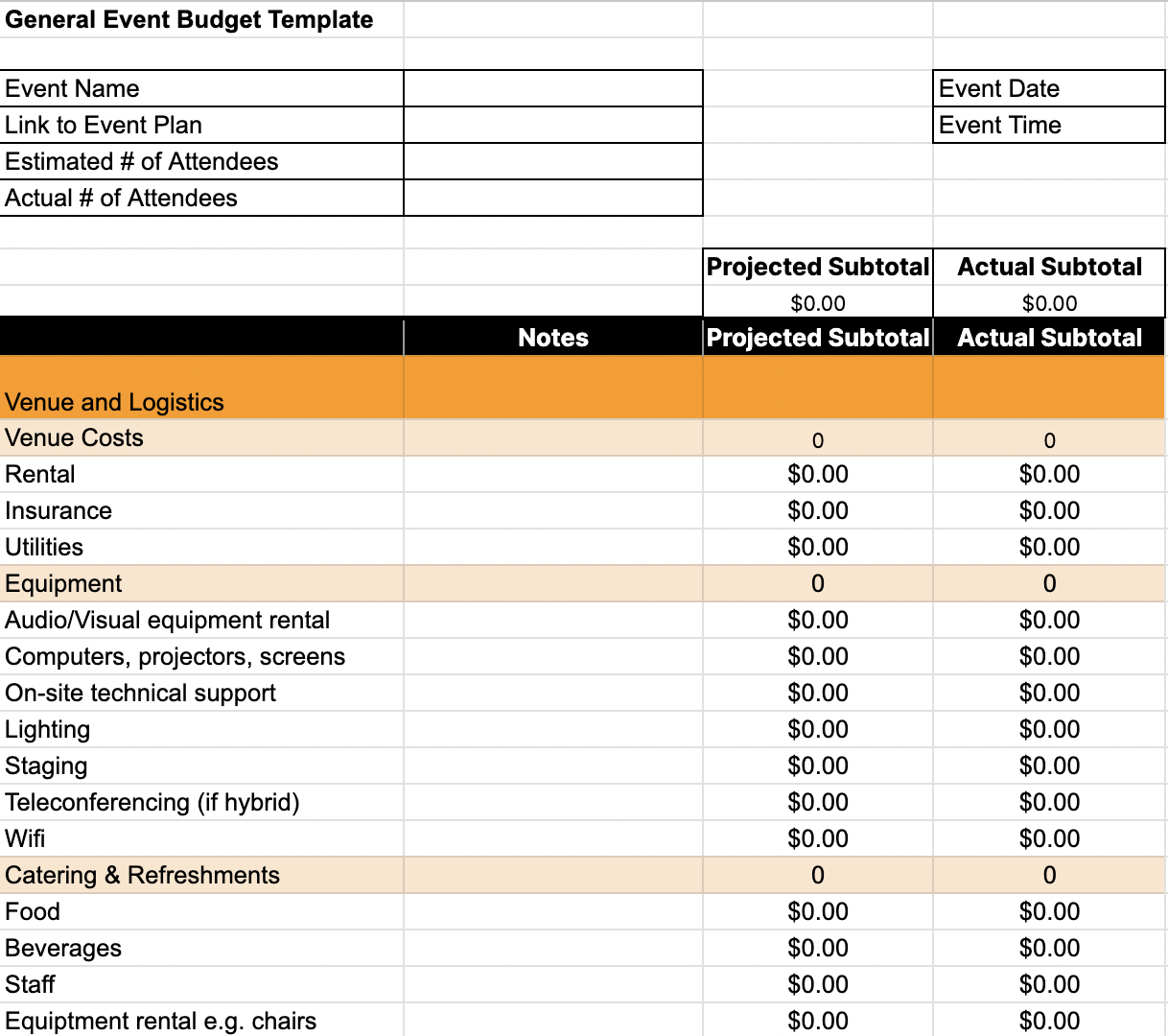
A general event budget template is an adaptable tool suitable for a variety of events. It covers all basic costs, providing a flexible option for smaller events or those that do not fit into a specific category.
When planning an event, it’s crucial to consider every possible cost that might be incurred to ensure an accurate and comprehensive budget. Here are some typical expenses you should include:
The real value of event apps is being enjoyed by the organizations using event apps for the multiple events that are run every week. Having an event app for these smaller, more frequent events, gives attendees more engagement and involvement with the event, leading to a better experience with your organization. Want to discover more? Read the full white paper.
Download the Simple Event Budget Template for free
Every event is unique, with its own set of expenses and income potential. It’s crucial to find a template that best fits the event’s nature, enabling precise and effective budgeting. In this section, we will delve into the specifics of budget templates for hybrid events, conferences, corporate events, and general events. We’ll discuss how each template is tailored to cater to these events’ specific requirements and why it’s crucial to choose the right one.
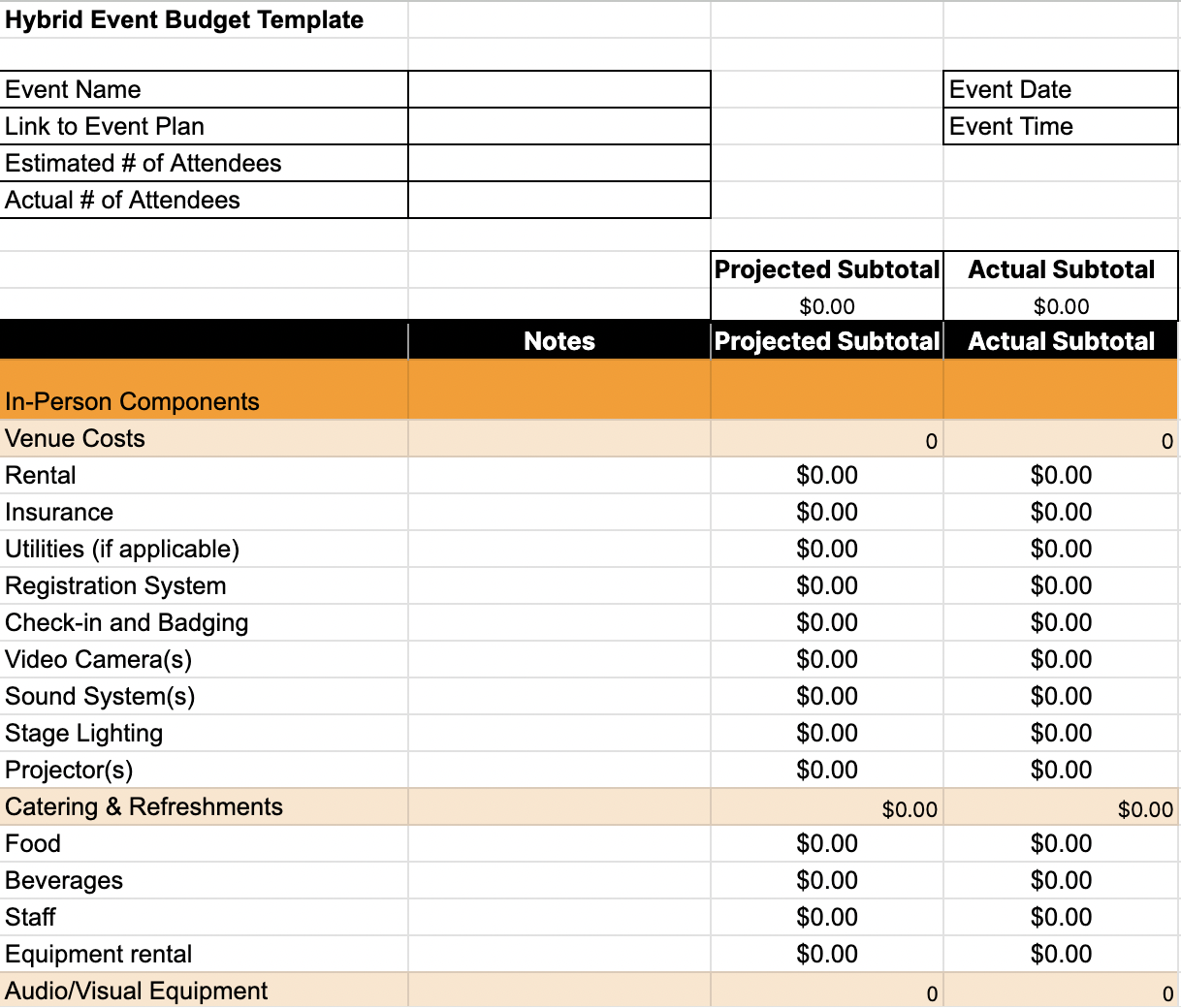
Because hybrid events can be broken down into in-person and virtual constituents, many planners worry whether the hybrid event budget is going to double as well. After all, they need to hire more event staff, pay for a virtual event platform, and engage two audiences in two completely separate ways while ensuring they can also interact with one another.
Because virtual events are usually cheaper to produce than in-person events, the hybrid event budget will not be double the traditional event budget.
In the post-pandemic world, hybrid events have gained popularity. A hybrid event budget template should account for a mix of physical and digital expenses. These are the main hybrid event budget items you should budget for:
Download the Hybrid Event Budget Template for free
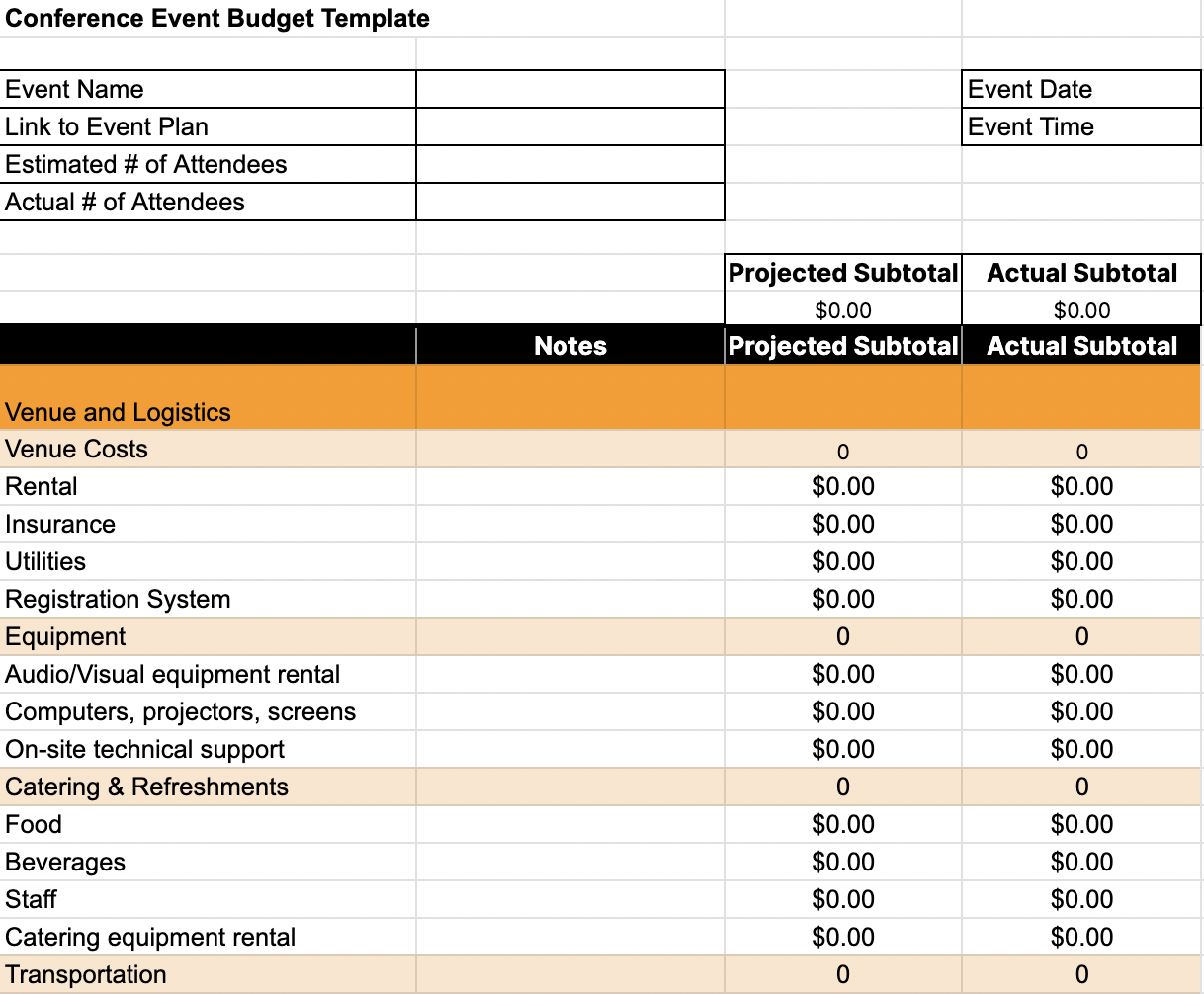
A conference budget template should cater to the unique financial requirements of conferences. This includes speaker fees, venue and equipment hire, catering, and marketing efforts. Also, potential revenue streams such as ticket sales and sponsorships should be considered. Here are 4 tips to help you budget for your next conference:
Establish Attainable Event Goals Aligned with Business Objectives
The clearer you articulate your event goals and the outcomes you aspire to achieve at your upcoming conference, the simpler it will be to devise a budget that aids in reaching these targets. Setting practical event goals allows you to prioritize expenses and effectively distribute resources.
Utilize Historical Data to Inform Your Budget Reflect on your previous events.
Did you overspend, underspend, or was your budget allocation just right? By reviewing past conference budgets and expenditures, you gain invaluable insights into spending trends and can identify areas where cost-cutting is feasible. Harnessing this historical data equips you to make more informed decisions regarding your event budget.
Avoid Neglecting Minor Items
They Can Quickly Accumulate One common pitfall event professionals encounter is underestimating the impact of small expenses. These can quickly add up and make a significant dent in your budget. Elements like printed materials, signage, name badges, and Wi-Fi access can often be overlooked. Therefore, it’s crucial to compile a comprehensive list of essentials for your event to ensure all key costs are covered.
Ensure Transparent Communication with Stakeholders About the Budget
The process of creating an event budget involves various components. To guarantee nothing is omitted, uphold clear and consistent communication with all event stakeholders, including management, finance teams, and event sponsors. By transparently communicating the projected costs, the reasoning behind each line item, and any changes throughout the planning journey, you can encourage an understanding and manage expectations effectively.
Read this case study to see how this leading International law firm managed to customize an app for events and successfully changed the experience of conferences.
Download the Conference Budget Template for free
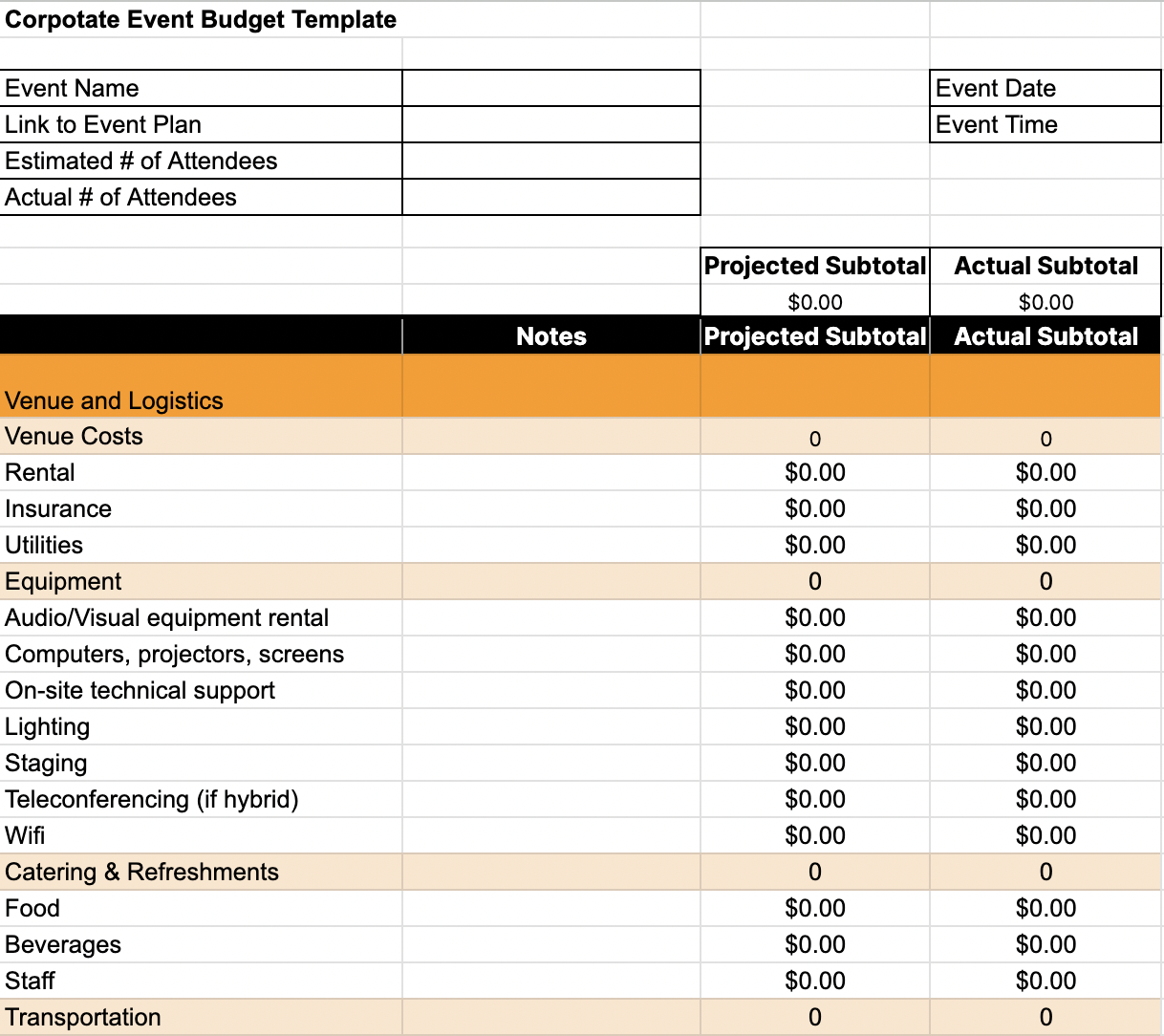
Corporate event budget templates need to accommodate the various costs involved, from the venue to entertainment. These templates help track potential income from sponsors or ticket sales, offering a clear snapshot of expected profit margins.
Here are some tips on how to create a corporate budget:
Download the Conference Event Budget Template for free
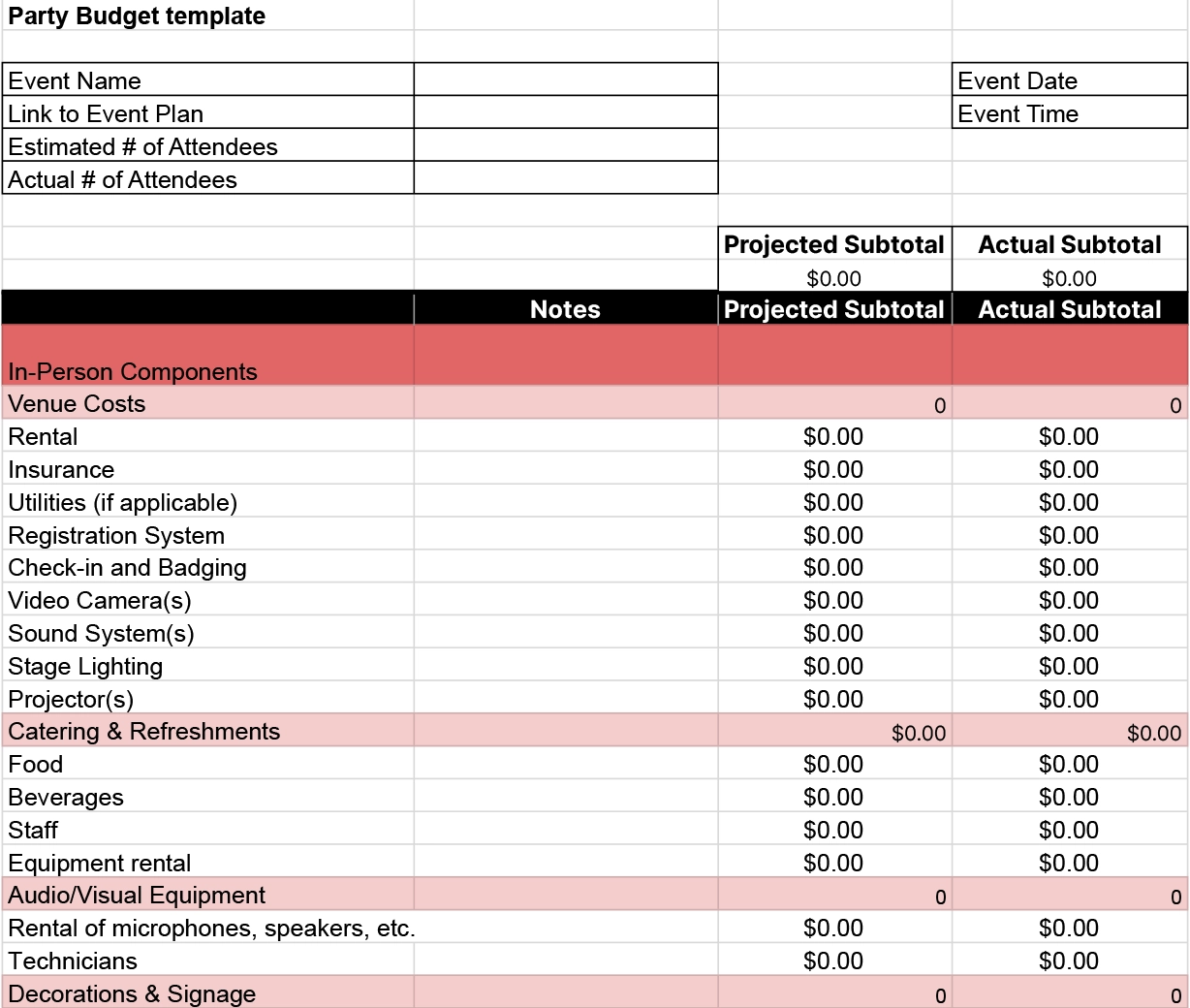
Download the Party Budget Template for free
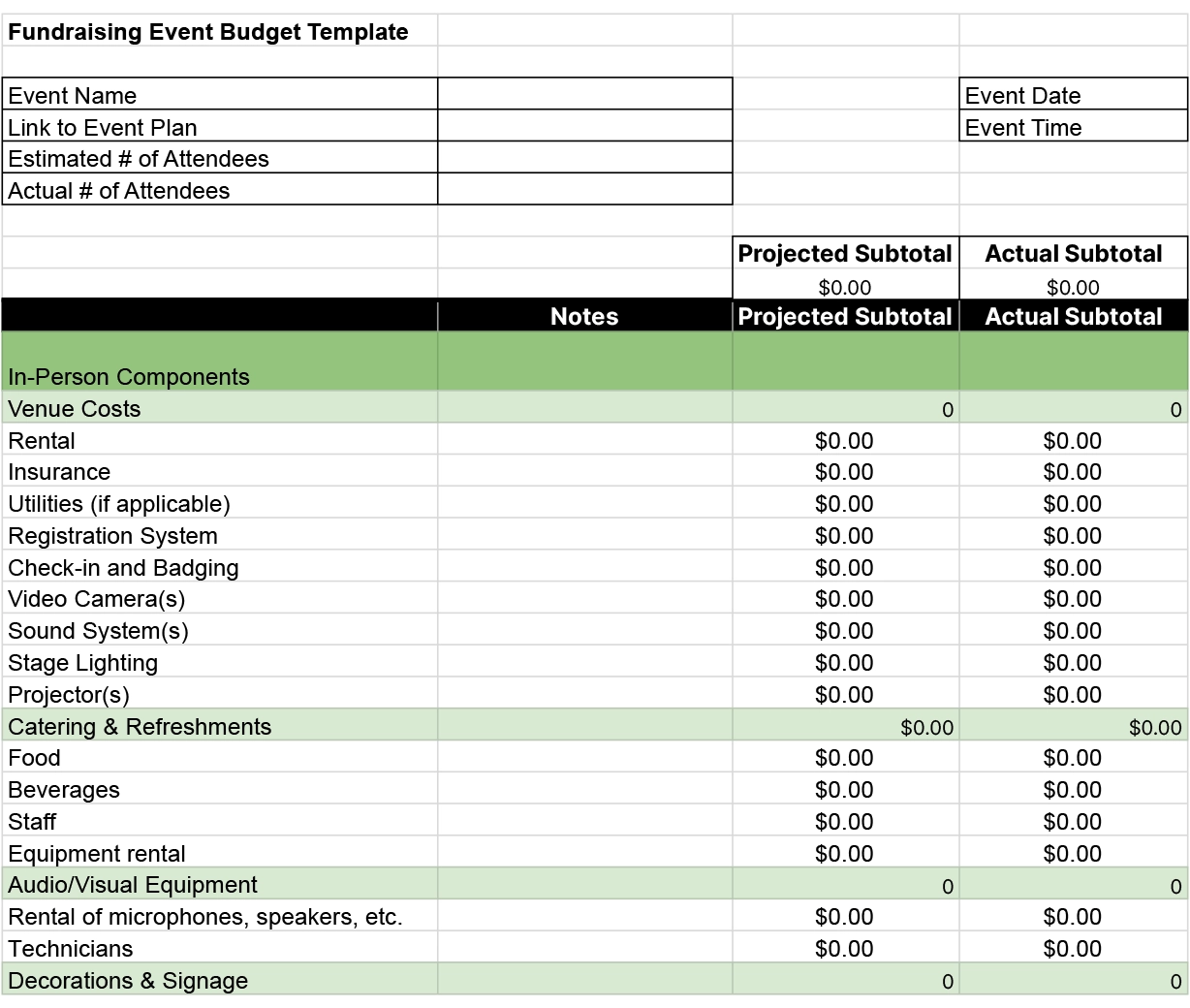
Download the Fundraising event budget template for free
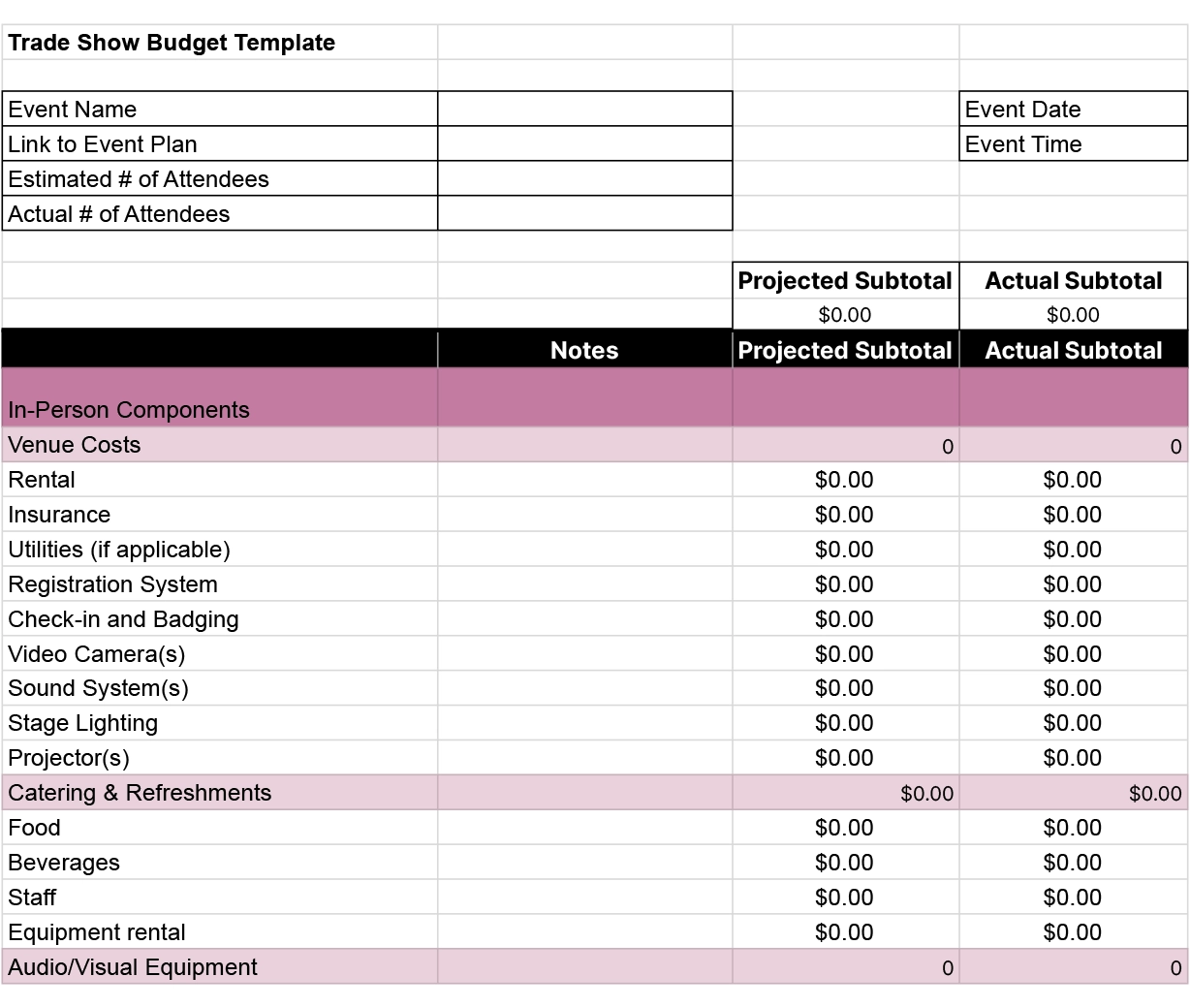
Download the Trade show budget template for free
Event budgets are arguably the most critical aspect of event planning and management. Every event, be it a large-scale conference or a small-scale corporate event, has a myriad of expenses and revenue sources to monitor. The absence of a consolidated system to manage them can result in crucial components being overlooked, thereby overshooting your budget.
Accurate estimation of expenses and revenue is an indispensable aspect of executing a successful event. This holds exceptionally true for recurring events such as annual conferences, seminars, or arts and music festivals. In this context, event planning budget templates serve as vital tools to maintain financial control and organization.
An event budget spreadsheet or worksheet functions as a centralized hub for tracking event expenses, including venue rentals, refreshments, marketing, advertising, and travel costs. Additionally, it also facilitates the management of income streams, such as ticket sales, vendor payments, merchandise sales, and advertising revenue.
Event budget templates empower you to balance planned costs against actual expenditures and validate the precision of profit projections. Therefore, an event budget template not only provides an overview of all costs, it also enables a clear understanding of where funds are allocated. This holistic perspective encourages strategic decision-making, limits overspending, and minimizes financial risks, providing accountability and transparency – essential characteristics for maintaining the confidence of stakeholders and sponsors.
However, there are a variety of different events which means each event requires a different budget template.
With the template we have created, you can now use it as an effective budgeting tool for your event. Here’s what you’ll need to do:
1. Add projected costs: In the spreadsheet, input the projected or estimated costs for the different factors that make up the event. This includes everything from venue rental to catering, marketing, and more. These projected costs serve as a baseline for your budget.
2. Include actual costs: As you progress in your planning and actual costs become known, you can enter them into the spreadsheet alongside the projected costs. This will allow you to see the difference between what you expected to spend and what you are actually spending.
3. Analyze and adjust: By comparing the projected and actual costs, you can identify areas where you might be overspending or where you have saved money. This insight can help you make necessary adjustments, either by cutting back in certain areas or reallocating funds where needed.
4. Monitor and update regularly: Continuously updating the spreadsheet with the latest cost information ensures that it remains a useful tool throughout the entire planning process. Regularly monitoring your budget helps keep spending on track and supports informed decision-making.
Discover how to plan your event budget using our detailed guide. Whether you’re utilizing an event budget template in Excel or Google Sheets, we’ll walk you through the crucial steps to outline your expenses and manage your finances effectively, ensuring your event, be it a conference or party, stays on track financially.
Step 1: Define your event goals
Start by clearly defining what you want to achieve with your event. This will guide your budgeting decisions and help you allocate resources wisely.
Step 2: List all possible expenses
Create a comprehensive list of potential costs, including venue, catering, technology, entertainment, staffing, and marketing. This step ensures you account for all aspects of the event.
Step 3: Research costs
Gather quotes and estimates for each expense category to get a realistic view of your potential spending.
Step 4: Create your budget template
Using tools like Google Sheets or Excel, set up your budget template. Organize it by categories of expenses, projected costs, and actual costs.
Step 5: Prioritize expenses
Determine which aspects of your event are most essential and allocate your budget accordingly. This might mean spending more on a high-quality venue if your event prioritizes attendee experience.
Step 6: Include a contingency fund
Always include a contingency fund of about 10-20% of your total budget to handle unexpected costs.
Learn to craft a compelling event budget proposal using our structured approach. From breaking down expenses in an event budget spreadsheet to presenting your financial forecast with clarity, this guide covers everything you need to secure stakeholder approval and support for your next big event.
Step 1: Summarize the event
Begin with a brief description of the event, including its purpose, target audience, and expected outcomes.
Step 2: Detail the budget
Provide a detailed breakdown of all projected expenses and income sources. Use clear categories (like marketing, catering, event-specific technology, etc.) and include both estimated and actual costs to show thorough planning.
Step 3: Justify the costs
Explain why each cost is necessary and how it contributes to the event’s goals. This helps stakeholders understand the value of their investment.
Step 4: Highlight financial control measures
Demonstrate how you will monitor and control expenses to stay within your event budget. This might include regular budget reviews and specific cost-saving strategies.
Step 5: Include supporting documents
Attach quotes, contracts, and other documents that support your budget estimates.
Explore the essential steps to create a comprehensive event expenses report. Using a straightforward event budget template or an event expense report template, we show you how to compile and analyze your financial data post-event, helping you provide transparency and insights into your event’s financial performance.
Step 1: Collect all financial data
Gather all receipts, invoices, and records of expenditures related to the event.
Step 2: Organize the expenses
Categorize the event expenses in a clear manner, similar to your initial budget template. This could include categories like venue, catering, marketing, and technology.
Step 3: Compare budgeted vs. actual costs
List both the projected and actual costs to highlight where you stayed on budget or where there were overruns.
Step 4: Analyze variances
Provide explanations for any significant differences between the budgeted and actual expenses in the event cost sheet (some AI can make analysis easier than ever). This analysis will be crucial for understanding budgeting accuracy and for planning future events.
Step 5: Summarize the financial outcome
End with a summary of the total costs in your event budget, how they were financed, and the financial outcome of the event (e.g., profit, loss, break-even).
Step 6: Include recommendations
Based on the financial outcome and variances observed, suggest ways to improve event budget management for future events.
A successful event does not have to equate to a sky-high budget. Strategic planning is key. A study by EventMobi found that 45% of event professionals expect budget cuts in 2023, underscoring the need for cost-effective planning. Here are some tips:
Are you an event manager looking to make the most of your budget while delivering an exceptional event experience? Look no further than Fliplet’s mobile and web event app. Here’s why building an event app can bring a strong ROI and how Fliplet stands out as the ultimate solution for your needs.
Investing in an event app can be a game-changer for your ROI. By providing attendees with seamless communication, personalized schedules, and interactive features, you enhance their engagement and satisfaction. This leads to more positive feedback, increased brand loyalty, and potentially higher attendance rates for future events. An app can also open doors for event sponsors and partners, allowing them to reach a targeted audience directly.
1. Engagement that lasts: An event app isn’t just an additional cost—it’s an engagement catalyst. It transforms the attendee experience from passive participation to active engagement. Attendees can personalize their schedules, network seamlessly, and interact with event content. This heightened engagement often leads to increased attendee satisfaction and loyalty.
2. Sponsorship amplification: Sponsors are vital to many events, and an app offers an innovative platform to showcase their brand. With interactive banners, sponsored sessions, and direct engagement opportunities, you can attract sponsors and potentially secure higher contributions, significantly impacting your event’s budget.
3. Data-ariven insights: The value of data cannot be overstated. An event app provides invaluable insights into attendee preferences, engagement patterns, and content effectiveness. These insights equip you to make informed decisions for future events, ensuring higher ROI over time.
4. Meeting attendee expectations: Attendees now anticipate more than just a standard event experience. They seek interaction, engagement, and personalized involvement. An event app fulfills these expectations by offering a dynamic platform for attendees to interact with event content, speakers, and each other. It’s a way to show your commitment to creating a memorable and cutting-edge event.
5. Seamless communication throughout: Gone are the days of relying solely on traditional communication methods. An event app provides a seamless channel for communication before, during, and after the event. Attendees can access event details, schedules, speaker bios, and even network with fellow participants—all from the convenience of their smartphones. This real-time interaction enhances engagement, builds excitement, and encourages attendees to stay connected long after the event concludes.
Fliplet sets itself apart from the rest with its unmatched versatility and customization. Unlike standard event apps, Fliplet empowers you to build an app tailored to your unique event requirements. With over 17 templates and thousands of features at your disposal, you can craft an app that truly reflects your event’s essence and differentiates it from others by adding your own stamp and branding to it.
Read this case study to see how a Top 30 UK Law firm switched from another solution to Fliplet and went from 40 minutes inputting the details for an event to getting an event live in the app in just 10-15 minutes.
Managing your event budget is a top priority, and Fliplet understands that. The platform offers different pricing plans to suit various event scales and budgets. Whether you’re organizing a small seminar or a large-scale conference, Fliplet provides cost-effective options without compromising on quality. By optimizing your event operations, enhancing attendee engagement, and facilitating sponsor interactions, Fliplet’s solutions contribute directly to your ROI. Fliplets pricing plans are:
For more information, check out the video demos of all Fliplet’s key features for their Event App Solution. With Fliplet, you’re not just organizing an event; you’re creating an experience.
An event budget template can transform the event planning process. By offering a clear view of your event’s financial landscape, you can plan more effectively and potentially increase your ROI. When combined with a tool like Fliplet, your event planning process can be both efficient and effective.

Niamh Conneely is the Content Writer and Marketing Executive at Fliplet – an app building platform that enables anyone to easily create engaging and interactive mobile and web apps.
Niamh has experience in content creation and writing and has achieved two level 6 awards for The Chartered Institute of Marketing. She has developed skills to help organizations deal with the challenges of a fast-moving marketplace. Connect with Niamh on Linkedin.
Yes, a nonprofit event budget template is ideal for charity events. It helps track donations and expenses to ensure the event is financially successful.
Yes, most event budget templates excel and google sheets versions can handle currency conversions. This makes them suitable for international events.
Absolutely! The event budget template is flexible and can be tailored to suit any event type or size.
An event budget report is a comprehensive document that details all financial aspects of an event. It compiles and compares both projected and actual costs across various categories—such as venue hire, catering, event production, and marketing—listed in an event budget spreadsheet. This report also includes potential revenue sources like ticket sales and sponsorships, using tools such as free event budget templates in Excel or Google Sheets.
The goal of an event budget report is to track financial performance, ensure transparency, and provide insights for future event planning, enhancing both accountability and financial planning for events ranging from conferences to parties.